500 Lygon St, Brunswick East; 03 9383 1386
Are you ever inclined to show no restraint when ordering a pizza with your own selection of toppings? To go for everything that you like, rather than just three or four complementary flavours? The staff at Golden Pizza have done just that with one of the gourmet pizzas on their specials board, the aptly named 'Fusion'. It features: three types of tomatoes (the standard tom base, sun-dried and roma), two types of cheese (mozza and bocconcini), three vegetables (eggplant, roasted peppers and pumpkin) plus a meat (Virginian ham).
Golden Pizza's standard base is a lot thicker than many, so it can handle the overload. And so can my tastebuds. This pizza was delicious. The thicker base is fluffy on the inside with a crisp base, and not too sweet. There wasn't huge evidence of the sun-drieds, but the romas added juicy bursts of tomato flavour. I think pumpkin is a natural fit as a pizza topping, but perhaps its preparation needs dictate the fact that it's not always popular. Here it was wonderfully mushy against the crisper base. My goodness, there are still so many flavours to describe! Both the eggplant and roasted peppers added their own degree of smokiness. The eggplant, happily, was finely cut so it didn't 'string out' as can be the case when it's laid on in larger slices. The Virginia ham contributed some subtle meatiness much as bacon might. All in all, I was thoroughly impressed.
SG did in fact construct his own pizza. Ordering from the everyday menu, he went for the chicken pizza, which invites you to pick your own accompaniments. His choices were capsicum and mushroom, with the requisite BBQ sauce. The chicken pieces were chunky and as such dried out a little in the oven. This pizza was perhaps more akin to something we'd be likely to rustle up in our own oven, as far as the toppings went in any case. But the proof for any pizza establishment is in the base, and Golden Pizza have a lot to lay claim to in that regard to make them well worth the stopover on the way home.
The chicken pieces were chunky and as such dried out a little in the oven. This pizza was perhaps more akin to something we'd be likely to rustle up in our own oven, as far as the toppings went in any case. But the proof for any pizza establishment is in the base, and Golden Pizza have a lot to lay claim to in that regard to make them well worth the stopover on the way home.
Golden Pizza I
31 May, 2008
Golden Pizza II
25 May, 2008
Sigiri
338 High St, Northcote; 03 9482 6114
 The Yak was too full to squeeze in two more momo-hunting dinner goers. Just a few doors up the road is Sigiri, whose vacant tables and relatively calmer atmosphere (in comparison to not just Wild Yak but much of High St that night) lured us in. Part of its calm atmosphere was created by notably muted lighting, much of which seeped through red light shades, conditions that were well beyond standard-issue camera equipment. Since it was Eurovision Weekend, however, I've dotted the post with pictures of some of the acts instead :)
The Yak was too full to squeeze in two more momo-hunting dinner goers. Just a few doors up the road is Sigiri, whose vacant tables and relatively calmer atmosphere (in comparison to not just Wild Yak but much of High St that night) lured us in. Part of its calm atmosphere was created by notably muted lighting, much of which seeped through red light shades, conditions that were well beyond standard-issue camera equipment. Since it was Eurovision Weekend, however, I've dotted the post with pictures of some of the acts instead :)Sigiri have an interesting set-up. Each night they run a buffet for $25 per
 head ($22 on Thursday). This features two entrees (eg crumbed tuna and potato balls), beef, chicken and vegetable curries, side dishes, at least half a dozen types of bread, including hoppers, and dessert. Customers can also dine a-la-carte, though on this Saturday night it was off a limited selection of the normal menu.
head ($22 on Thursday). This features two entrees (eg crumbed tuna and potato balls), beef, chicken and vegetable curries, side dishes, at least half a dozen types of bread, including hoppers, and dessert. Customers can also dine a-la-carte, though on this Saturday night it was off a limited selection of the normal menu. Some menu items, including the stir fries (baduma) would take a while to cook, and I was on my way to a movie ('Pudor', at the Spanish Film Festival) so we went with two very straightforward dishes: harakmas (seasoned beef in curry sauce) and kukulmas (boneless chicken in spicy sauce) and a serve of eddi appa, or 'string hoppers'. These are made from a combination of rice flour, water and salt, which is forced through a mould to create the squiggly, latticed effect.
Some menu items, including the stir fries (baduma) would take a while to cook, and I was on my way to a movie ('Pudor', at the Spanish Film Festival) so we went with two very straightforward dishes: harakmas (seasoned beef in curry sauce) and kukulmas (boneless chicken in spicy sauce) and a serve of eddi appa, or 'string hoppers'. These are made from a combination of rice flour, water and salt, which is forced through a mould to create the squiggly, latticed effect. was tender and swimming in sauce, whereas the beef was a little (only a little) tough and the dish could have used some more moisture overall. The texture of both sauces seemed to borrow from a gravy style, in that they were somewhat grainy. The beef curry sauce was loaded with cardamon, and the chicken sauce was strongly spiced without being too hot. Neither, happily, seemed overloaded with oil or ghee so while we were both quite full without finishing our serves, it wasn't an uncomfortably heavy feeling.
was tender and swimming in sauce, whereas the beef was a little (only a little) tough and the dish could have used some more moisture overall. The texture of both sauces seemed to borrow from a gravy style, in that they were somewhat grainy. The beef curry sauce was loaded with cardamon, and the chicken sauce was strongly spiced without being too hot. Neither, happily, seemed overloaded with oil or ghee so while we were both quite full without finishing our serves, it wasn't an uncomfortably heavy feeling.20 May, 2008
'A Short History of Tractors in Ukrainian' - Marina Lewycka
18 May, 2008
Devour Cafe
806 High St, Thornbury; 03 9484 8496 now closed
 At that size, it's something you'd want to take slowly, but on this occasion it was somewhat tepid, so it was a matter of get into it or be relegated to slurping a sorta-warm chocolate.
At that size, it's something you'd want to take slowly, but on this occasion it was somewhat tepid, so it was a matter of get into it or be relegated to slurping a sorta-warm chocolate.Luckily there was time to be taken. Any trip to Devour leads SG or me to the Devour Burger, a divine, decadent meal that sports a pattie so enormous it carries a minimum 30 minute preparation time. When the burger arrives, it's speared with a skewer in order to keep the tennisball pattie sandwiched between the kaiser bun along with cheese, avocado, sun-dried tomatoes, spinach leaves, caramelised onions and tomato chutney.
 They've left no filling preferences to chance! The dish comes with a choice of eggplant or potato chips. I'm yet to sample the former, but the latter are extraordinary. They're chips of the long, flat kind, crisp and doused in delectable seasoning.
They've left no filling preferences to chance! The dish comes with a choice of eggplant or potato chips. I'm yet to sample the former, but the latter are extraordinary. They're chips of the long, flat kind, crisp and doused in delectable seasoning.Devour also does a fine line in specials, particularly on their breakfast menu (eg their famous baked eggs). One of today's options was Eggs Krumpin. Something to do with eggs and crumpets, perhaps? Indeed! Two crumpets done french toast-style: dipped in egg, cream and parsley, then fried and served with bacon, maple syrup and Devour's baked beans (home-made, served with herbs and chilli). All very intriguing, but unfortunately my curiousity remained as unsated as yours...they were out of beans (out of beans! It's a Thornbury tragedy).
Second choice was their Breakfast Burger: everything good about a fry-up, but this time wedged between two slices of bread rather than beside.
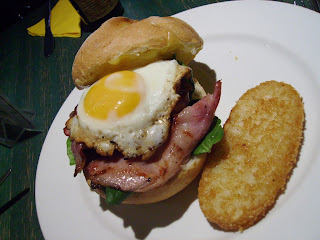 The bread in question is a Kaiser bun: a huge, round roll with a little pointy bit at the top - looks like an old-school helmet or a crown. Inside said bun is sausage, bacon (happy the carnivore), a fried free-range egg, spinach, tomato chutney and a huge smear of melted cheese on the top half. As if that wasn't enough, nestled beside the burger was a hashbrown: deliciously crispy and salty crumbing around moist, fall-apart potato. Who needs chips?
The bread in question is a Kaiser bun: a huge, round roll with a little pointy bit at the top - looks like an old-school helmet or a crown. Inside said bun is sausage, bacon (happy the carnivore), a fried free-range egg, spinach, tomato chutney and a huge smear of melted cheese on the top half. As if that wasn't enough, nestled beside the burger was a hashbrown: deliciously crispy and salty crumbing around moist, fall-apart potato. Who needs chips? Devour is a small cafe, always welcoming. The fitout is all warm colours, with teal walls and drapes. The front section is brightened by sun coming through the plate glass windows; the slightly elevated back section is a warm place to sit by the fire, admire the artwork and work your way through a hot drink. There's also a courtyard out the back if you want to take in some sun, maybe with a locally brewed 3 Ravens beer.
Devour is a small cafe, always welcoming. The fitout is all warm colours, with teal walls and drapes. The front section is brightened by sun coming through the plate glass windows; the slightly elevated back section is a warm place to sit by the fire, admire the artwork and work your way through a hot drink. There's also a courtyard out the back if you want to take in some sun, maybe with a locally brewed 3 Ravens beer. 17 May, 2008
Danny's Take-away
Best burger in town is a coveted title for any establishment devoted to flipping patties; and it's one that many pundits have granted to Danny's. Recent trends in burger franchising have tended toward the gourmet: their menus run the gauntlet from avocado to zitar. Danny's is the opposite in approach and the winner in value and flavour.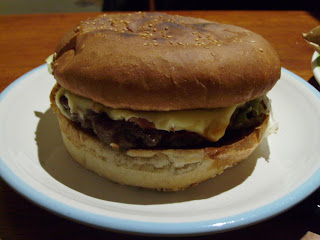
Their burgers start with a good pattie, which after grilling still retains a mincey texture. Their basic burger is bun, pattie, lettuce and onion, and it's $4.50. Not much to fault there. Working down the menu lets you build a burger to take your fancy, adding bacon, cheese, tomato or an extra pattie or two. Even their works burger is only around $7.50, well shy of the $10 or so starting point of 'fancier' places.
For me the winning element at Danny's is the buns, the insides of which are lightly toasted. I always like that extra crunch and it means the sauce, and cheese if you've asked for it, melts into the bread. Their chips, too, bring the crunch and are salty without being dehydrating.
Having served Melbourne since 1945, Danny's retains a great retro interior, perfectly suited to burger, chips and an old-style bottle of soft drink.
Pizza Farro III
608 High St, Thornbury; 03 9484 2040
 Pizza Farro is rightly renowned for its spelt-based pizzas and on our most recent visit I'd had every intention of furthering my acquaintance with their selection. While browsing the pasta specials, however, the combination of pumpkin, spinach, pine nuts and ricotta became too tempting to forego. Nor would I forego spelt by choosing this option, as it's also the grain of choice for their pastas.
Pizza Farro is rightly renowned for its spelt-based pizzas and on our most recent visit I'd had every intention of furthering my acquaintance with their selection. While browsing the pasta specials, however, the combination of pumpkin, spinach, pine nuts and ricotta became too tempting to forego. Nor would I forego spelt by choosing this option, as it's also the grain of choice for their pastas.
Pizza Farro isn't the cheapest eatery around - in most sections of their menu dishes start from around $18, travelling up to $23 or so for those with finer ingredients - but their produce is high quality, their cooking well-considered and their serving sizes ample. Their pizzas only come in one size, but it's a large one. The pasta alla zucca is similarly generous: The generosity extends to flavour. The cubed pumpkin is at a stage of mushiness that leaves it at the whim of your fork: pierce to pick up whole, or squash to dissolve. The ricotta, by comparison, holds its firmness; the pinenuts as always bring the crunch and the spinach some coarseness. The spelt pasta, too, brings a subtle distinction to the dish: matched with the pinenuts its hint of nuttiness lifts the flavour.
The generosity extends to flavour. The cubed pumpkin is at a stage of mushiness that leaves it at the whim of your fork: pierce to pick up whole, or squash to dissolve. The ricotta, by comparison, holds its firmness; the pinenuts as always bring the crunch and the spinach some coarseness. The spelt pasta, too, brings a subtle distinction to the dish: matched with the pinenuts its hint of nuttiness lifts the flavour.
SG also managed to wrest his tastebuds from the salsicce pizza of our last visit. He's not one to stray too far from the pork, however, and selects the calzone with napoli, bocconcini, spicy pork sausage, mushrooms and, wait for it, truffle oil.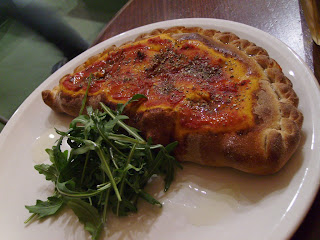 The combination of field mushrooms and truffle gives a wonderful earthiness to balance the spicy sausage. Some mouthfuls of the folded pizza are a little heavy on dough, but that's more about filling distribution than any fault of the dish.
The combination of field mushrooms and truffle gives a wonderful earthiness to balance the spicy sausage. Some mouthfuls of the folded pizza are a little heavy on dough, but that's more about filling distribution than any fault of the dish.
Service, as always, was helpful and friendly. We'll need to call on their help during future visits, I would think, as the menu keeps getting harder to choose from.
11 May, 2008
Cider Festival, Kellybrook Winery
I've previously established my predilection for cider, so it's no surprise that Kellybrook Winery's annual Cider Festival is set to become an autumn fixture for me. The Festival celebrates not just cider but also the West Country culture, in which cider is a far more refined drink than a monolith like Fosters (who distribute Strongbow) would credit it to be.
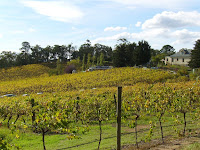 The winery's bucolic setting is the first indication of the pleasures in store. En route from the carpark a demonstration of cider pressing is under way, the crates of apples giving out their sweet scent as they also surrender their juices. The sound of bells joins the aroma of apples in the air, as Morris dancers snack and drink between their own demonstrations. Music plays all day, a magician is on hand, and the usual cellar door offers tastings of Kellybrook's wines, including a champagne cider, riesling, shiraz, pinot and apple brandy.
The winery's bucolic setting is the first indication of the pleasures in store. En route from the carpark a demonstration of cider pressing is under way, the crates of apples giving out their sweet scent as they also surrender their juices. The sound of bells joins the aroma of apples in the air, as Morris dancers snack and drink between their own demonstrations. Music plays all day, a magician is on hand, and the usual cellar door offers tastings of Kellybrook's wines, including a champagne cider, riesling, shiraz, pinot and apple brandy.The winery has a restaurant on site and on Festival days there's a clearly worn path from its door to the food tent. The food on offer is limited but fitting: pea and apple soup with sourdough, Boscastle pies, Ploughman's and Squire's sandwiches, and hot chips. The Squire's lunch is a sourdough roll with pork and apple sauce.
 The Ploughman's is also squeezed into a sourdough bun and features a wodge of cheddar, greens and chutney.
The Ploughman's is also squeezed into a sourdough bun and features a wodge of cheddar, greens and chutney.
Bellies sated, it's time to slake one's thirst. The fresh-pressed cider comes a variety of ways: there's mulled, warmed and intensified with the addition of cloves, cinnamon, nutmeg and perhaps some sugar. There's draught or bottled cider, and for those parked on the grounds straight apple juice: $1 for a small glass, $2 for a large. That's a great value vitamin fix. Enormous barrels keep filling four-litre bottles of scrumpy. This is West Country-style cider, traditionally made from late-season apples. Kellybrook's version is still rather than sparkling, and will keep fermenting in the bottle. It's smooth and dry, with a slight ginger bite at the end.
When hunger returns, a feast of desserts waits to greet it.
 Not all are apple-based: there are brownies, orange-almond cake and fig cake. The apple custard sponge and traditional apple pie bring the crowd's attention back to the star of the day, however.
Not all are apple-based: there are brownies, orange-almond cake and fig cake. The apple custard sponge and traditional apple pie bring the crowd's attention back to the star of the day, however. All desserts come with cream, which one can lavish on to their heart's content. It's a good analogy for the day really: there's as much decadence and pleasure available as you care to ladle out.
All desserts come with cream, which one can lavish on to their heart's content. It's a good analogy for the day really: there's as much decadence and pleasure available as you care to ladle out.http://www.kellybrookwinery.com.au/
05 May, 2008
'Mister Pip' - Lloyd Jones
 Mister Pip brings a new reading to an old, classic story, in a highly unlikely setting. The native residents of a small, Bougainvillean island are cut off during the civil war that beset the region in the 1990s. The white residents - nearly all of whom are there due to the presence of the mine at Panguna - have left, except for Mr Watts, an enigmatic Englishman, married to Grace, a native of the island. He takes over as teacher for the local school and begins to read to the students from Great Expectations.
Mister Pip brings a new reading to an old, classic story, in a highly unlikely setting. The native residents of a small, Bougainvillean island are cut off during the civil war that beset the region in the 1990s. The white residents - nearly all of whom are there due to the presence of the mine at Panguna - have left, except for Mr Watts, an enigmatic Englishman, married to Grace, a native of the island. He takes over as teacher for the local school and begins to read to the students from Great Expectations.
Addendum: Given the point in the final paragraph about plot shift, I was interested by some comments made by Lloyd Jones in an article in A2 (in The Age), ahead of his appearance at the Melbourne Writers' Festival. To quote directly:
'Jones...is especially suspicious of narrative. When he began Mister Pip, he intended to write a book with no narrative at all..."I was trying to avoid narrative because, when you write it, sometimes it's like a runaway bloody thing, it's voracious, it just wants more of itself," he says...in [earlier novel] Here at the End of the World We Learn to Dance Jones slips the rope by refusing to fulfill our expectations of what a fictional narrative will deliver...As readers, we want omniscience; as a writer, Jones refuses to allow it.'
I couldn't shake the jolt of that plot jump - like how your hands keep tingling after your bike tyre hits a pothole at speed - and wondered why it hadn't been smoothed out. From these statements, however, it's clearer that for Jones such a jump is not a negative issue in a novel's progression; absolute congruity is the product of a 'manufactured' story. I still argue that the novel would be improved by way of some roadfill, but having heard Jones' opinion I can surmise that even if it had been flagged by an editor, correcting it would not necessarily have been his priority in the finished product.
03 May, 2008
Tasmania - Cafes and morsels
 Food can be part of both the wonder and frustration of travelling. Finding new places to dine and new cuisines to sample is an exciting and often splendid experience. Sometimes, in unfamiliar territory, it can instead be hard to source a great encounter or, indeed, any dining options at all. Conversely, in a new town, the options are so numerous that the odds of hitting a bad one are worringly high. Happily, our Tasmanian experience was one where things turned out well more often than not.
Food can be part of both the wonder and frustration of travelling. Finding new places to dine and new cuisines to sample is an exciting and often splendid experience. Sometimes, in unfamiliar territory, it can instead be hard to source a great encounter or, indeed, any dining options at all. Conversely, in a new town, the options are so numerous that the odds of hitting a bad one are worringly high. Happily, our Tasmanian experience was one where things turned out well more often than not.
Bakeries were our breakfast destination of choice. I miss European bakeries, where, while a white breadroll could easily be a culinary event, they offer extensive sweet and savoury options. In Australia it's often all bread, muffins and pastry with cream in (perfectly acceptable in the right place, but not so often for breakfast).
Morning #1 turned out very well, with a vegetable pasty from Sheffield hitting exactly the right spot for fillingness, indulgence and nutritiousness. Now, I have an important question, which I'd love you to answer via the comments: Do you pronounce pasty (as in 'a type of pie in which a circular piece of pastry is folded around a filling'):
a) to rhyme with nasty
We'd been hoping for some woodfired pies in Exeter after our Tamar Valley wine run, but the way the day panned out saw us dodging logging trucks and chasing regeneration fires on the road to Pipers Brook before hunger struck. Luckily Pipers Brook vineyard (makers of excellent riesling and gewürztraminer) had a cafe on site.
Theirs was a simple menu of six or so dishes, averaging about $15 and featuring local produce. Their own wines were generously available for $5 a glass. I selected an open baguette, with chicken, tomato pesto, mushroom, sundried toms, greens, King Island brie, topped with lemon aioli.
 Phew! A bit like something you'd put together if you needed to use up as many ingredients as possible, and happily something that worked very, very well. I wasn't sure what the tomato pesto would involve, but it was a little like a nutty chutney. The brie was wonderful, the French-style bread held its copious topping well and the aioli added a subtle and welcome tartness. The only downer was that all the wines I sampled afterwards tasted of sundried tomato!
Phew! A bit like something you'd put together if you needed to use up as many ingredients as possible, and happily something that worked very, very well. I wasn't sure what the tomato pesto would involve, but it was a little like a nutty chutney. The brie was wonderful, the French-style bread held its copious topping well and the aioli added a subtle and welcome tartness. The only downer was that all the wines I sampled afterwards tasted of sundried tomato!SG got his pie after all, going for the beef pot pie with sweet potato, and tomato relish on the side.
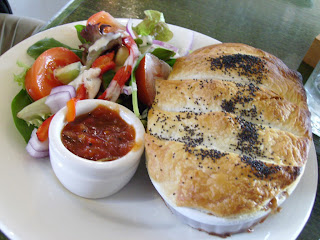 It was a fine choice. The beef pieces were chunky and tender, balanced by the sweet pot, and the vibrant, fresh tomato relish added some great contrast. We picked up some astonishing strawberry jam to take home too.
It was a fine choice. The beef pieces were chunky and tender, balanced by the sweet pot, and the vibrant, fresh tomato relish added some great contrast. We picked up some astonishing strawberry jam to take home too.Pies also came to the rescue at Port Arthur. Stops at one too many gasp-worthy clifftop lookouts had us arriving at the deservedly famous site a couple of hours later, and much hungrier, than planned. We were booked on a tour 20 minutes after arrival, and grabbed a locally made pie each from the respectable Felons diner. Mine was chicken and camembert.
 Crisp pastry, gooey cheesiness and chunks of meat: a perfect belly-filler.
Crisp pastry, gooey cheesiness and chunks of meat: a perfect belly-filler.Before heading to the Freycinet Peninsula we'd planned breakfast at Eureka Farm, south of Scamander, which does a range of fresh fruit, berries and preserves and make its own ice cream, which it serves at breakfast with pancakes. The chef was at the dentist though (!) so we made do with a jar of quince butter (extraordinary with Tas brie and crackers), a cone of strawberry ice cream and some apples. Retracing our steps to Scamander's Gourmet Food Shop, which is also the post and trading office, we were at first dismayed by their range, limited to pies and sausage rolls. Happily they were also harbouring savoury muffins: sundried tom, capsicum, mushroom, fetta and parmesan to be exact.
 No, that's not their range, that's all in the one muffin! Warmed and with butter, it proved a fine start to the day, as did SG's two mini sausage rolls.
No, that's not their range, that's all in the one muffin! Warmed and with butter, it proved a fine start to the day, as did SG's two mini sausage rolls.
Our only cafe breakfast was in Hobart, at Say Cheese on Salamanca Square. A big sign advertising all manner of pancakes hooked us. They served about eight varieties, as well as standard bacon and eggs breakfast fare. My Summerberry Pancakes came with seasonal fruit compote, blueberry ice cream, berry sauce and cream.
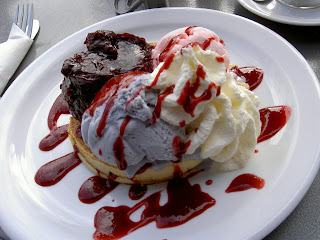 Um, yes, that's quite a visual delight! Ice cream for breakfast is a wonderful notion, made entirely civilised by the fact I approached it with knife and fork, rather than spoon. The rivulets of melted cream running down the side of the pancake were enormously enticing. The 'fluffy' pancakes spruiked on each menu item were actually dense and doughy, but with all that fruit and ice cream going around I wasn't too bothered.
Um, yes, that's quite a visual delight! Ice cream for breakfast is a wonderful notion, made entirely civilised by the fact I approached it with knife and fork, rather than spoon. The rivulets of melted cream running down the side of the pancake were enormously enticing. The 'fluffy' pancakes spruiked on each menu item were actually dense and doughy, but with all that fruit and ice cream going around I wasn't too bothered.
